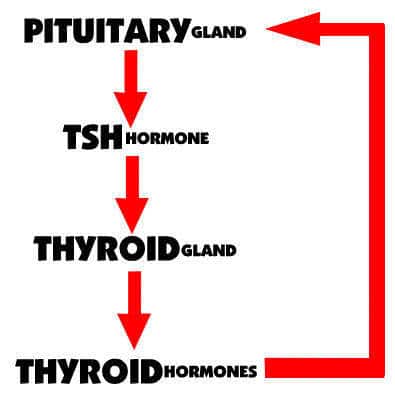Individuals often suffer for years being told that their thyroid, testosterone, estrogen, progesterone and adrenals are fine, but these doctors are finding that these levels are actually low and need to be supplemented, often with remarkable results. Hypothyroidism is a frequently missed diagnosis, even if you’ve been told that your thyroid was tested and is normal. Hypothyroidism is a condition in which the thyroid gland does not produce adequate thyroid hormones, which are T4 and T3.Thyroid hormones are critical to health, contributing to metabolic rate, energy, and cognitive function. There are several different types of hypothyroidism, but in most cases, people who have a hypothyroid condition will feel tired, lack focus, and may experience dry skin, cold extremities, constipation, or weight gain.
TSHMost physicians measure thyroid function by testing levels of TSH. Thyroid Stimulating Hormone(TSH) is produced by the pituitary gland and stimulates the thyroid gland to produce thyroid hormones. TSH levels are supposed to automatically increase to compensate for low thyroid hormone production. When this happens, TSH levels become abnormally high and indicate a hypothyroid condition.
Many people, especially women, do not adequately convert T4 to the active T3, resulting in low levels of active thyroid hormone and symptoms of low thyroid with a normal TSH. Also, there is another problem in that T4 cannot only be converted to T3, but it can also be converted to reverse T3, which is inactive and blocks the thyroid receptor.
Unfortunately, most physicians are using an outdated and unnecessarily wide reference range when determining normal TSH levels. You may actually be hypothyroid, but have been told by your physician that your thyroid level is normal. A normal TSH level is between 0.3 and 2.5 as determined by the American Association of Clinical Endocrinologists. However, most physicians and labs are using a outdated range of 0.30 to 5.00. Therefore your TSH level may increase to what appears to be a very normal looking 3.60, when you may in fact be quite hypothyroid.
A recent study in the medical journal Archives of Internal Medicine found that women with low normal thyroid (sub-clinical hypothyroidism) are 70% more likely to have arthrosclerosis (hardening of the arteries) and over twice as likely (200% increase) to suffer a heart attack. This low normal thyroid that is going untreated is not only resulting in millions of women unnecessarily feeling fatigued, depressed and being unable to loss weight, along with all the other symptoms of low thyroid, but it is also resulting in heart attacks and deaths that could easily be prevented.
Many hypothyroid conditions are caused by an autoimmune condition that attacks the thyroid gland. There are two major thyroid antibodies, called thyroid peroxidase antibody and anti-thyroglobulin antibody. The presence of these antibodies can indicate an autoimmune condition called Hashimotos Thyroiditis. This condition can be present even if your TSH is normal, and it may affect your need for thyroid hormone.
Treating Hypothyroidism
The most common treatment for hypothyroidism is levothyroxine, or T4. Levothyroxine is also known under the brand names Synthroid and Levoxyl. T4 is then converted by the body into T3, the active thyroid hormone. T3 (Cytomel) is sometimes prescribed, but it has a very short half-life (about 2 hours), and must be taken several times a day to be effective. Levothyroxine is identical to the T4 hormone that your body makes, and is a very effective medication.
Armour thyroid is another medication sometimes used to treat hypothyroidism. Armour thyroid is a glandular product, meaning that it is the ground-up porcine gland. It contains T4, T3, and the other constituents of the thyroid gland.Some people respond better to levothyroxine but others feel better on Armour thyroid.
* These statements have not been evaluated by the Food and Drug Administration. The product mentioned in this article are not intended to diagnose, treat, cure, or prevent any disease. The information in this article is not intended to replace any recommendations or relationship with your physician. Please review references sited at end of article for scientific support of any claims made.



















Share: